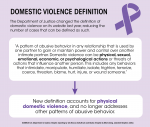Los Angeles City Council members opposed changes made to the definition of domestic violence on the United States Department of Justice website.
The DOJ Office on Violence Against Women changed the definition of domestic violence on its website in April, limiting the definition to only felony or misdemeanor crimes. Councilmembers Paul Koretz, Nury Martinez and Monica Rodriguez spoke out against the change Feb. 1 and moved for a resolution for the City Council to oppose any administrative action limiting the definition.
According to an archived version of the DOJ website, domestic violence was originally defined as a pattern of abusive behavior in any relationship and constituted physical, sexual, emotional, economic or psychological actions taken against a partner.
The current definition on the same website is shortened, stating domestic violence only includes felony or misdemeanor crimes of violence committed by current or former spouses, intimate partners or other persons.
Koretz, who represents City Council District 5, which includes UCLA, said narrowing the definition discredits victims and removes their qualifications for recovery, according to a press release.
Alison Simard, a spokesperson for Koretz, said the district wanted to ensure that victims of certain types of domestic abuse no longer encompassed by the new definition still receive proper support.
“There are people who may not have been physically struck but have been emotionally tortured, and we want to be sure they’re still going to receive the services they need,” Simard said.
Alicia Oeser, director of UCLA’s Campus Assault Resources & Education program, said the change to the DOJ’s website hasn’t changed how the law defines and treats domestic violence.
“I think that that really is the important distinction, that factually we should really get right that it hasn’t changed the legal statute,” Oeser said. “The criminal statute used to prosecute crimes of domestic violence is not impacted by this and cannot be changed by the president.”
Allison Korn, an assistant dean for experiential education at the UCLA School of Law, said laws regarding domestic violence have not changed, but the narrowing of this definition may cause victims to think otherwise and discourage them from seeking help.
“I believe that the Department of Justice has said that they will continue to enforce the statute, the law hasn’t in itself changed,” Korn said. “What most advocates in this case are concerned about is that by changing the definition, the Department of Justice’s Office on Violence Against Women may decide only to support – provide grant money, provide training materials or other supportive resources – only to a very narrow definition of victims or survivors of domestic violence.”
Korn added the changed definition only takes the criminal aspects of domestic violence into account.
“This new definition suggests that domestic violence only exists in the criminal scenario,” Korn said. “So it would have to rise to the level of criminal conduct in order for women and men, anyone experiencing an intimate partner violence, to receive resources and support.”
Allison Randall, chief of staff for the DOJ’s OVW, said in an email statement that the office continues to follow the legal definition of domestic violence rather than the definition on their website and funds are still being properly dispersed to domestic violence programs.
“OVW has always used the statutory definition in carrying out its mission,” Randall said. “By following the statute, the department ensures the funds made available by Congress are employed in the most effective manner possible to reduce violence and to assist crime victims.”
Koretz, Martinez and Rodriguez also introduced a motion last week asking the Los Angeles Police Department to report any impacts to federally funded anti-domestic violence programs caused by the definition change.
Oeser said even if the legal definition of domestic violence is not changed, the societal definition may change as a result of the DOJ’s actions, which could impact how domestic violence is handled in the future.
“The way we engage with each other is going to be based on a different set of standards and expectations for our behavior, and the ability to say ‘Well, the government didn’t count this’ is nearly as important as the actual change,” Oeser said. “But still there is an important conversation around why this change has merit because of the way it will impact our cultural and shared society.”
Oeser added she hopes the definition change won’t affect students seeking help.
“We still understand relationship violence as encompassing many facets of behavior that may never include physical violence and certainly do not have to be reported as crimes,” Oeser said. “It is not our job to measure, to judge or determine someone’s experience.”
